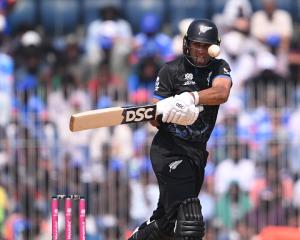Loyalty has its price. Just ask Black Caps and Otago wicketkeeper-batsman Brendon McCullum.
He is believed to have turned his back on $500,000 to play for his country.
And he is not alone.
The likes of Daniel Vettori, Ross Taylor, Jesse Ryder and Jacob Oram are among a small elite group of New Zealand cricketers whose ability to earn money on the twenty/20 circuit far exceeds what they can hope to earn playing for their country.
With the Indian Premier League set to expand from eight to 10 teams in 2011, you can probably add Shane Bond and Martin Guptill to that list.
NZC cannot hope to match the potential earnings of its top contracted players but will have to dig deep next year to help limit the players' losses.
The contracts expire at the end of July and mutiny brews.
There are genuine fears players will turn down New Zealand contracts unless they are offered a bigger slice of the pie.
As free agents they would be at liberty to play in lucrative twenty/20 tournaments around the world.
McCullum, Vettori and Oram, for example, were signed by IPL franchises for more than $1 million.
Stick with NZC and the budget is more cashew nuts than caviar, with players earning a retainer of between $72,000 and $174,000.
Match fees boost the overall salary package to what ordinary New Zealanders would think of as a pretty good deal.
But earlier this year, McCullum, Vettori, Taylor, Ryder, Oram and Kyle Mills delayed signing national contracts over concerns they would lose out financially because of a scheduling clash between the IPL and Australia's tour of New Zealand in March.
A compromise was reached which meant dropping a test from the planned three-test series.
Not everyone was satisfied, though.
The public missed the opportunity to watch Australia shred the Black Caps batting line-up and New Zealand's other test players, the ones not lucky or good enough to demand an IPL contract, were out of pocket and out of a job.
IPL commissioner Lalit Modi singled out McCullum for trying to exploit a loophole which would allow him to play in the tournament as a free agent.
A special meeting was called in September and rules were designed to prevent players from rejecting national contracts in order to play in the IPL.
Players now need a no-objection certificate from their national boards to play in the league.
However, New Zealand Cricket Players Association executive manager Heath Mills described the situation as a sideshow which did not address the real issue.
"We all want to see the best players playing international cricket," he told the Otago Daily Times earlier in the year.
"The only way we can make that happen is not by making up new rules or picking and choosing who players can work for. We need to get the structure right and establish a window for the IPL. That will solve this problem."
But is stopping all international cricket for the month of April for a domestic competition going too far?
That would put enormous pressure on the international schedule which is already bulging at the seams trying to accommodate three versions of the same game.
It would also put the more garden-variety international cricketer out of a job for the month.
The reality remains players will find the pull of the almighty dollar far too great unless concessions are made.
But it is important to remember the reputation players trade on was forged in the cauldron of international cricket, not some Frankenstein-like creation where cricket mercenaries pad their wallets and their billionaire owners flex their egos.
It is all just a tad meaningless and, to prove the point, who won the IPL this year? Had to think about it, didn't you?









